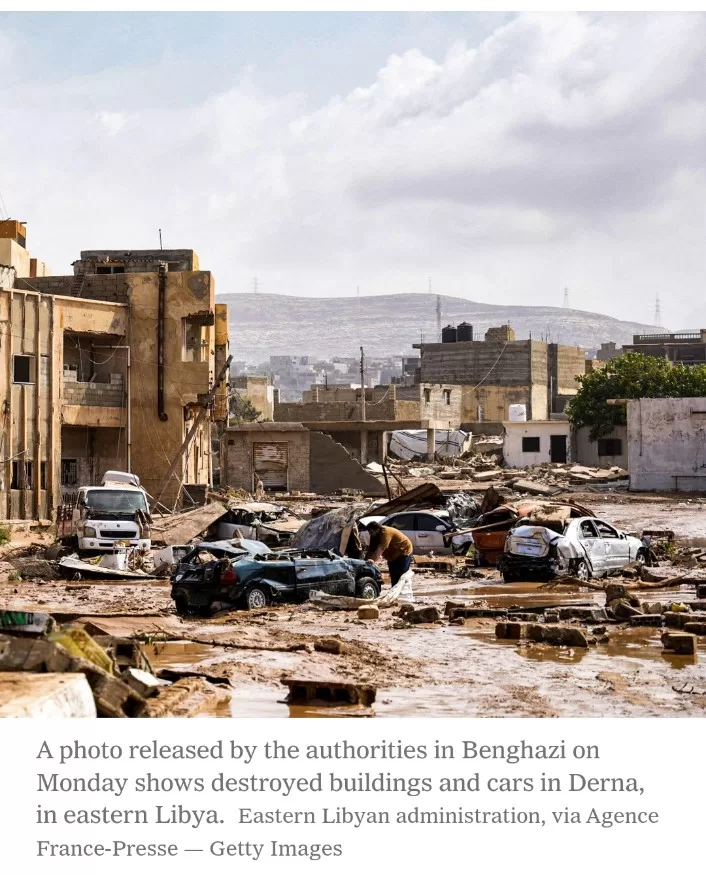Libya- International aid efforts are gradually making their way to the ravaged port city of Derna, where an investigation has commenced into the harrowing possibility that up to 20,000 lives were claimed by the relentless fury of Storm Daniel, which struck the northern coast of Libya on Saturday night.

Initial reports from official aid organizations such as the Libyan Red Crescent suggested that 10,000 individuals had been declared missing in the aftermath of the catastrophic storm. However, a chilling, revised estimate of 20,000 casualties has been put forth by Abdul Rahim Maziq, the director of Al-Bayda Medical Center.
As Derna’s streets remain strewn with corpses, the scarcity of potable water adds to the grim challenges facing survivors. Entire families have been obliterated by this natural disaster, exacerbated by the remote locations of some villages and the rudimentary state of local governance. The painstaking process of confirming the death toll is expected to take time.
Hichem Abu Chkiouat, the Minister of Civil Aviation in the administration governing eastern Libya, grimly noted that the “sea is constantly dumping dozens of bodies,” emphasizing the monumental financial burden that reconstruction efforts will impose, likely running into billions of dollars.
The International Organization for Migration (IOM) in Libya has reported that, as of Wednesday, over 30,000 individuals have been displaced in Derna, the epicenter of Storm Daniel’s devastation. Additionally, 6,085 people have been confirmed as displaced in other storm-affected regions, including Benghazi. The exact number of casualties remains unverified.
Aid agencies have been grappling with formidable obstacles in their efforts to reach Derna, which is home to just over 100,000 residents. The destruction of vital roadways has compelled the deployment of helicopters, with Egypt playing a significant role in providing this essential air support.
Countries with historical ties to Libya, including Turkey, the United Arab Emirates, and Egypt, have dispatched assistance. However, the conveyance of crucial supplies, medical personnel, and trucks is underway from western regions towards the affected areas.

Despite the urgency of the situation, it appears that the international emergency response has been sluggish, partly due to the focus on the earthquake in Morocco and the time required for experts to grasp the full extent of this calamity.
France has announced its contribution, dispatching a field hospital and approximately 50 military and civilian personnel capable of treating around 500 individuals daily.
Political wrangling has already erupted within Libya regarding the vulnerability of Derna to the destructive force of Storm Daniel. Musa al-Koni, a member of the Libyan presidential council, expressed that “it had not been expected that this hurricane would be this strong and destructive to this extent, especially since the country had not witnessed such devastating storms before.” He called for swift, collective efforts to address the crisis, emphasizing the need to avoid blame games.
Maj Gen Ahmed al-Mismari, a spokesperson for the Libyan National Army, dominant in eastern Libya, asserted that their units had acted promptly upon the storm’s arrival, fulfilling their responsibilities comprehensively. He underscored the Libyan people’s resilience in the face of adversity, emphasizing the acceptance of fate and destiny.
Al-Mismari detailed the challenges posed by the floods, particularly the vulnerability of all bridges in Derna. He lauded the efforts to find alternative routes and highlighted the unity among Libyans in welcoming displaced families. Hotels and schools have opened their doors to provide shelter, while development agencies are extending support in the form of cover, medicines, and humanitarian services amid the ongoing search and rescue operations.
As assistance continues to arrive by air and sea, concerns linger for the well-being of those residing south of the Green Mountain, an area relatively unheard of but potentially affected by the calamity.




